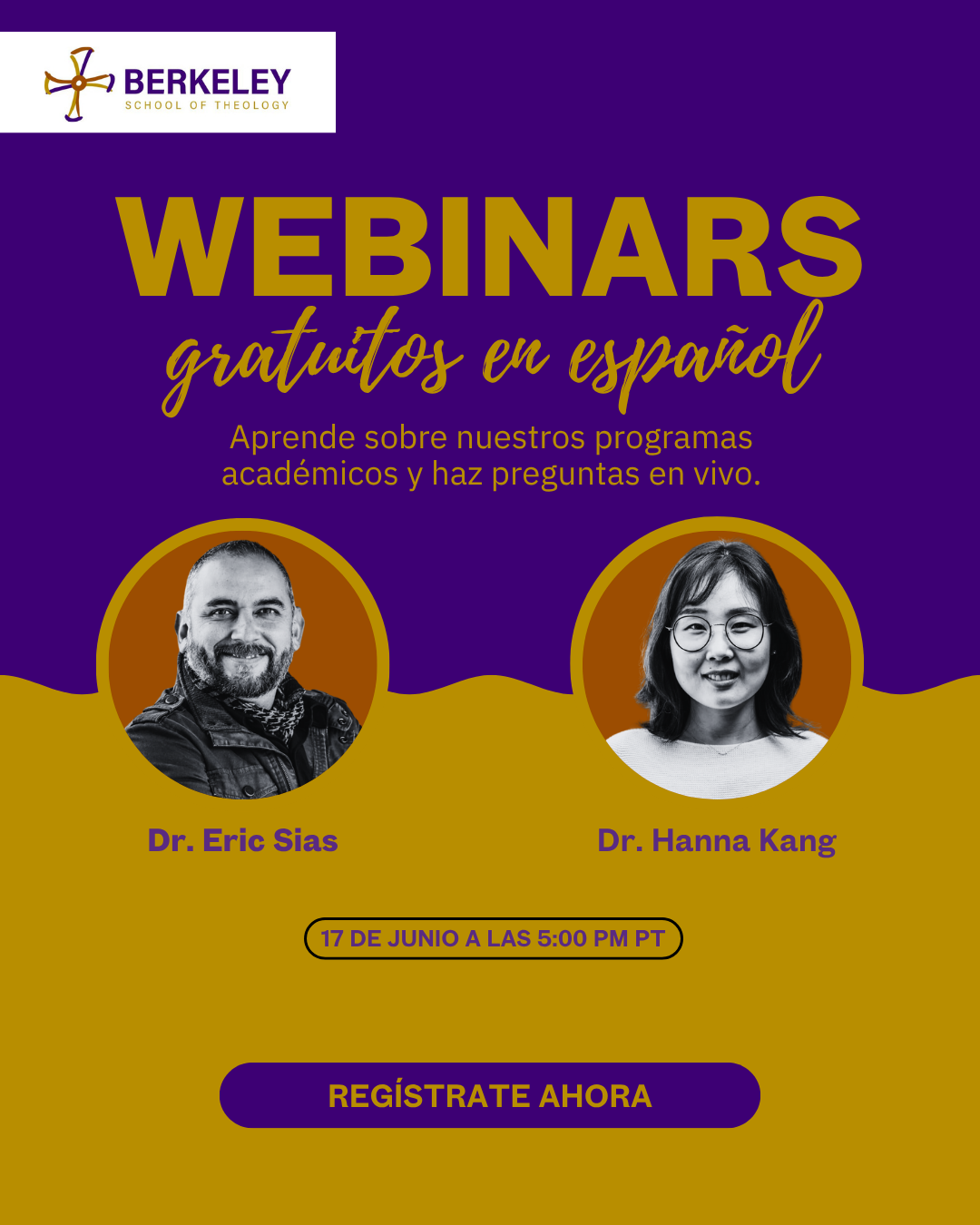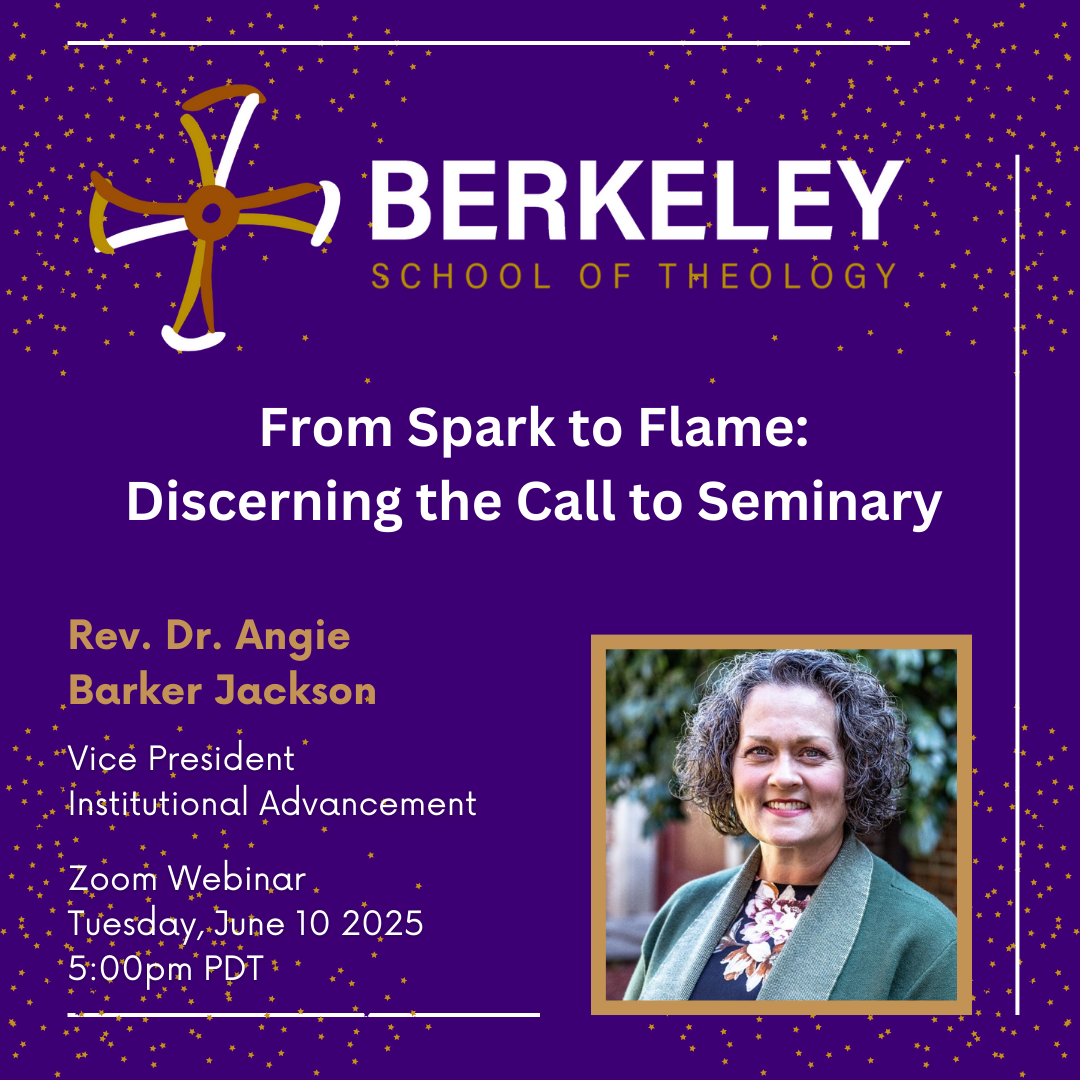INTERSESSION 2026 COURSES
| Course Number | Name | Credits | Instructor | Schedule |
|---|---|---|---|---|
| DM-6080 |
Becoming Culturally Responsive, part 2
For DMin students who have completed most of their competencies and are ready to refine dissertation proposals for submission to Academic Committee for candidacy review. Prerequisite completion of DM-6078 Becoming Culturally Responsive, part 1 & DM 6046 Research Methods. Class meets daily, 1/5/2026- 1/9/2026, from 9:10am-5:00pm, in hybrid formats (in-person and Zoom option). | 3 | Miles-Tribble | Intersession 2026 January 5-9, 2026 9:10am - 5:00pm Concurrent Hybrid |
SPRING 2026 COURSES
| Course Number | Name | Credits | Instructor | Schedule |
|---|---|---|---|---|
| BAEQ-207 |
Political Theology
This course examines religion through a liberation theology lens—Black Liberation Theology, Womanism, and Queer Theology. Liberation theologians argue that religion and politics cannot, and should not, be separated. Liberation theology holds that genuinely following God requires working for justice in the real world, especially for the poor and oppressed. It views social inequality and poverty not as unfortunate accidents but as results of human-made systems that must be confronted. | 3 | Reagans | Spring 2026 Wednesdays 3:00pm-5:00pm Online Synchronous |
| BAEQ-603 |
Spiritual and Personal Formation
By the end of this course, students will be better equipped to articulate their spiritual journeys, develop sustainable practices for personal growth, and discern how spiritual formation informs leadership, service, and life beyond the classroom. | 3 | Davidson | Spring 2026 Thursdays 3:00pm - 5:00pm Online Synchronous |
| BAEQ-607 |
In Search of Soul: Howard Thurman & Quest for Democratic Space
This course explores Howard Thurman’s lifelong “quest for democratic space,” a journey he saw as synonymous with “America in Search of a Soul.’ We will analyze Thurman not just as a theologian, but as a mystic-prophet whose unique “strange freedom’ enabled him to lead a divided nation. The course traces the arc of his vision, beginning with The Roots of a ‘Strange Freedom’ to understand how the prophet was forged. From there, we explore The ‘Creative Encounter,’ analyzing how Thurman’s deep mysticism and confrontation with sin produced a transformative gospel for the oppressed. We will then follow this inward journey into the public square, investigating his ‘Bold Adventure’ of forging interracial community at the Fellowship Church for All Peoples amidst the ‘Luminous Darkness’ of American segregation. Finally, culminate by exploring The Disciplines of the Spirit as the essential practice for healing the nation’s soul and realizing his ultimate vision for a “community of God”. The course would have four parts: | 3 | Wright-Riggins | Spring 2026 Fridays 12:40pm-3:30pm Online Synchronous |
| BS-1250 |
Using Biblical Language
Students will be introduced to the basic elements of biblical Hebrew and Greek. This course is designed for those seeking to understand the components of the biblical languages for ministerial purposes, however, any who are interested in Hebrew and Greek are encouraged to attend. The course content and curriculum will include preparation in the use of Hebrew and Greek lexical aids, as introduction to the fundamentals of linguistic theory, and exposure to exegetical and hermeneutical methods. This course is a requirement for all BST students; however, students from across the Graduate Theological Union are welcome and encouraged to take this course. This course will be a hybrid format. | 3 | Flesher | Spring 2026 Wednesdays 5:10pm - 8:00pm Hybrid |
| DM-6015 |
DMin in Thesis
Credit hours for preparation of dissertation. | 3 | BST Faculty | Spring 2026 |
| DM-6046 |
Research Methods
This core Doctor of Ministry course has been created specifically to train DMin students in creating viable research methods for their DMin projects that will generate reliable qualitative data. Evaluation based on seminar participation, research training exercises, a book review, and a first draft of the D.Min. research proposal. Course will meet throughout the semester in remote synchronous format using Zoom and include asynchronous elements on Moodle. Typically taken six months after DM-6078 Becoming Culturally Responsive: Part I. | 3 | Torgerson | Spring 2026 Wednesdays 5:10pm - 8:00pm Concurrent Hybrid |
| DM-6666 |
Continuing Fee
For BST DMin students only, upon completion of coursework until completion of dissertation. | 6 | BST Faculty | Spring 2026 |
| FE-2109 |
Internship II
Students must have an approved internship to engage in supervised ministry placement for MDIV and MCL degree requirements. Format | 3 | BST Faculty | Spring 2026 Mondays 4:00pm-5:30pm Online |
| HM-2508 |
Prophetic Preaching
This preaching course will be operated in a hybrid model. In addition to remote (Zoom) engagements for theoretical and practical elements of prophetic preaching, the class will have required offline onsite visits, including preaching experiences, to have firsthand experiences of prophetic ministries. For those living outside the SF Bay Area, special arrangements may be made in consultation with instructors for them to visit sites of their local cities. By doing so, this course will identify several central issues around prophetic preaching in contemporary societies. Students will preach and videotape three sermons and post them on Moodle for feedback. The students are expected to bring together class discussions and field trip experiences to their sermons and their vision for prophetic preaching in their own ministry. | 3 | Park/Thompson | Spring 2026 Tuesdays 6:10pm-9:00pm Concurrent Hybrid |
| HM-2600 |
Resistance, Rhetoric and Public Square
We will define rhetoric and how the art form informs homiletics and strategies in sacred, secular, and public square settings. For this course, we will limit our focus to sermons delivered by Gardner C. Taylor in various settings. We will read and view some of his sermons, respond, and react to his pulpit work and consider the rhetorical context(s). Group discussion will enhance our understanding of topic and written papers will be utilized to evaluate our academic proficiency. Class will be hybrid, Auditors welcome. | 3 | Evans | Spring 2026 Mondays 2:10pm-5:00pm Concurrent Hybrid |
| HM-4258 |
Prophetic Preaching
This preaching course will be operated in a hybrid model. In addition to remote (Zoom) engagements for theoretical and practical elements of prophetic preaching, the class will have required offline onsite visits, including preaching experiences, to have firsthand experiences of prophetic ministries. For those living outside the SF Bay Area, special arrangements may be made in consultation with instructors for them to visit sites of their local cities. By doing so, this course will identify several central issues around prophetic preaching in contemporary societies. Students will preach and videotape three sermons and post them on Moodle for feedback. The students are expected to bring together class discussions and field trip experiences to their sermons and their vision for prophetic preaching in their own ministry. | 3 | Park/Thompson | Spring 2026 Tuesdays 6:10pm-9:00pm Concurrent Hybrid |
| HM-4300 |
One of a Kind: Gardner C. Taylor and His Homiletic Method
Gardner C. Taylor was considered one of the most effective 20th century’s preachers in the English-speaking world. Taylor was a one of a kind (sui generis) preacher, who was broadly known for his Victorian eloquence, perfect diction, his volcanic sermonic eruptions and at other times, he was known for speaking just above a whisper. In this course, we will study his homiletic method. This includes his hermeneutic, narrative development, theology, rhetoric, sermon structure and delivery. In addition, we will listen to a variety of Taylor’s sermons from points in his long career and different settings, (i.e., academic and church contexts) and attempt to locate differences, similarities, and effectiveness. | 3 | Evans | Spring 2026 Tuesdays 2:10pm-5:00pm Concurrent Hybrid |
| HM-8135 |
Palabra Transformadora
Esta materia explora la predicación como un acto teológico, ético y político que busca la transformación personal y social. Este curso de predicación está diseñado para que los estudiantes aprendan los elementos teóricos y prácticos de la predicación contemporánea de diversas tradiciones. Se abordará la predicación como diálogo entre texto, contexto y comunidad. Habrá conferencias, escritos semanales y debates sobre temas relacionados con la comprensión actual de la predicación en contextos en constante evolución, y los estudiantes predicarán en clase. | 3 | L. DaValle | Spring 2026 Tuesdays 6:10pm-9:00pm Online Synchronous |
| HSPR-2501 |
Rethinking Mission
The term mission can sound outdated in contemporary theological discourse, often evoking notions of imposed Christian imperialism. But is that the true meaning of mission? Has the antiquated understanding truly disappeared, or do its specters still linger today? This course begins with classical conceptions of mission and traces their development into contemporary theological and ministerial contexts. Doctoral students may participate with an upgrade. | 3 | Kang | Spring 2026 Thursdays 5:10pm-8:00pm Concurrent Hybrid |
| IDS-2050 |
Theology and Ministry in the Age of Migration
This course is designed for master’s students to help them a) explore the diverse patterns of global migration in today’s context and b) discuss why migration should be brought to the center of theological reflection. Because the course integrates studies from different fields, students are expected to approach the subject in an interdisciplinary way. Doctoral students might join with an upgrade. | 3 | Kang | Spring 2026 Mondays 2:10pm-5:00pm Concurrent Hybrid |
| IDS-4300 |
Capstone Innovation Project
As a culmination of the course work and internship experiences in the MDiv program, this course provides students an opportunity to design, develop, and implement a ministerial project in their areas of interest based on biblical, theological, and practical foundations. With the feedback of fellow students, mentors, and professors, students write a 20-25 page-long Ministry Innovation Project to identify and address a social, ecclesial, or systemic issue of need to which this project responds theoretically and practically. Students will also present an abbreviated version of this Project in a form of video so that it may be shared with a wider audience. | 3 | Park | Spring 2026 Wednesdays 6:10pm - 9:00pm Concurrent Hybrid |
| IDS-8102 |
Navigating the Complexities, part 2
Creative Church & Community, Spirituality & Resilience, Justice & Reconciliation, Border-Crossing. These are all topics that will be addressed through the lenses of Bible, Theology, Ethics, History, and Praxis as a means of introducing and preparing the online student to /for the work of theological study and reflection. In part 1 of this two-part, year-long, MTS core online introduction the student will engage key terms, concepts, and methodologies; in part 2 (spring semester) the student will make application of all of the above to a topic of their own choosing. [This is the only core course for the BST MTS=Master’s in Theological Studies and a supporting course for BST DMIN students] | 3 | Flesher/Faculty | Spring 2026 Asynchronous/Online |
| LIEQ-405 |
Liderazgo y Cultura
Este curso estará enfocado en orientar a los estudiantes hacia una comprensión básica sobre las diferentes culturas como una realidad contextual, la influencia de esta realidad en nuestro que hacer como iglesia y el rol del liderazgo eclesial en medio de los desafíos de la diversidad. Se hará énfasis especial sobre el desempeño activo y el compromiso de los líderes cristianos en medio del multiculturalismo, como parte de su llamado. | 3 | Morataya | Spring 2026 Thursdays 5:00pm-8:00pm Online Synchronous |
| LIEQ-502 |
Fe en Contexto Cultural
Este curso examina la relación dinámica entre fe y cultura, mostrando cómo las tradiciones religiosas moldean a las sociedades y cómo los contextos históricos y lingüísticos transforman las expresiones de fe. Mediante diálogo ecuménico y el estudio de temas como símbolo y rito, inculturación, religiosidad popular, liderazgo y género, pluralismo y espiritualidad digital, se fomenta una comprensión crítica de la diversidad religiosa contemporánea. Con clases por Zoom, foros en línea y un proyecto final integrador, el estudiantado desarrollará herramientas para construir comunidades inclusivas, dialogantes y comprometidas con la justicia y la paz. | 3 | Silveira | Spring 2026 Mondays 5:00pm-8:00pm Online Synchronous |
| LIEQ-510 |
Donde Está Dios: Una Ética del Margen
Este curso les presenta a los estudiantes los principios fundamentales y los diversos enfoques dentro de la ética social cristiana, al mismo tiempo abordará cómo las hermenéuticas bíblicas marginadas y las teologías desde la opresión ofrecen perspectivas sobre dónde está Dios y qué puede querer Dios respecto a los problemas morales contemporáneos. El curso tiene como objetivo equipar a los estudiantes con una ética teológica para la praxis arraigada entre los sufrientes, para encarnar un liderazgo compasivo y una transformación fiel en sus contextos. | 3 | Perez | Spring 2026 Tuesdays 4:30pm-7:30pm Online Synchronous |
| NT-1080 |
New Testament Voices
In this introductory course, students will examine the origins and development of the texts, language, authors, dates, personalities, and significant themes that make up the New Testament through various interpretive approaches. Indeed, by reading and analyzing these texts from the perspective of multiple voices, students will appreciate not only the complexity of NT authorship but also the subsequent paradigms and theologies generated out of these texts, including their own. In this course, special attention will be given to the Hebrew Bible (LXX) and its role in the formation of the NT. This course is appropriate for masters-level students and satisfies part of the core requirements at Berkeley School of Theology. Students from across the GTU are welcome and encouraged to attend the course. Classes will be offered in a hybrid format. | 3 | Torgerson | Spring 2026 Mondays 5:10pm-8:00pm Concurrent Hybrid |
| OT-8136 |
El Antiguo Testamento Habla Hoy
Este curso ofrece una introducción básica al estudio y el mensaje de la Biblia Hebrea. Al finalizar, el estudiantado habrá adquirido una visión sociocultural y teológica de su contenido, de los debates críticos y de las metodologías exegéticas y hermenéuticas, al tiempo que desarrollará conciencia de su propia ubicación social y de cómo esta influye en la lectura, el pensamiento y la práctica bíblica, histórica y teológica. Además, aplicará enfoques, teologías e interpretaciones a preocupaciones contemporáneas de justicia social. | 3 | Melgar | Spring 2026 Thursdays/Martes 5:00pm-8:00pm |
| PR-3100 |
Servant Leadership and Organizational Stewardship
This course delves into the principles and practices of servant leadership and organizational stewardship within the context of both religious and secular communities. Students will explore the foundational philosophies and ethical frameworks that underpin servant leadership, examining how these principles can be applied to foster sustainable and impactful leadership within diverse organizational settings. Drawing from both classical and contemporary perspectives, the course will engage students in critical discussions on the role of leaders as stewards of resources, relationships, and the common good. Through case studies, readings, and reflective exercises, students will develop a nuanced understanding of servant leadership as a transformative approach to leadership that prioritizes humility, empathy, and service to others. | 3 | Leander | Spring 2026 Thursdays 2:10pm - 5:00pm Concurrent Hybrid |
| PS-1062 |
Congregational Care
This course will seek to (1) define and describe the art of pastoral care and counseling and the contexts in which it takes place; (2) explore the needs and dynamics of people seeking help, as well as the self-awareness and skills required of the person in ministry; (3) provide opportunities for the practice and development of spiritual caregiving skills, including basic skills of listening, assessment, connecting with others, and communication of caring and hope; and (4) foster an environment wherein participants can reflect theologically on the issues, contexts, and crises faced by people in need. Course format includes discussions, lectures, student presentations, and five (5) required hours of pastoral practice labs beyond scheduled lecture sessions. Evaluation will be based on class and lab session participation, reflection papers, a case study, and weekly reading quizzes. BST core course. [25 max enrollment; Auditors excluded] | 3 | Mixon | Spring 2026 Tuesdays 3:40pm - 6:30pm Concurrent Hybrid |
| SPRS-8208 |
In Search of a Soul: Howard Thurman & Quest for Democratic Space
This course explores Howard Thurman’s lifelong “quest for democratic space,” a journey he saw as synonymous with “America in Search of a Soul.’ We will analyze Thurman not just as a theologian, but as a mystic-prophet whose unique “strange freedom’ enabled him to lead a divided nation. The course traces the arc of his vision, beginning with The Roots of a ‘Strange Freedom’ to understand how the prophet was forged. From there, we explore The ‘Creative Encounter,’ analyzing how Thurman’s deep mysticism and confrontation with sin produced a transformative gospel for the oppressed. We will then follow this inward journey into the public square, investigating his ‘Bold Adventure’ of forging interracial community at the Fellowship Church for All Peoples amidst the ‘Luminous Darkness’ of American segregation. Finally, culminate by exploring The Disciplines of the Spirit as the essential practice for healing the nation’s soul and realizing his ultimate vision for a “community of God”. The course would have four parts: | 3 | Wright-Riggins | Spring 2026 Fridays 12:40pm-3:30pm Online Synchronous |
| STSP |
Global Theological Perspectives
Together in this course we will engage theologies coming from Asian American, Black liberation, Dalit, feminist, indigenous/Naga, Korean communities. | 3 | Davidson | Spring 2026 Thursdays 5:30pm - 8:30pm Concurrent Hybrid |
FALL 2026 COURSES
| Course Number | Name | Credits | Instructor | Schedule |
|---|





